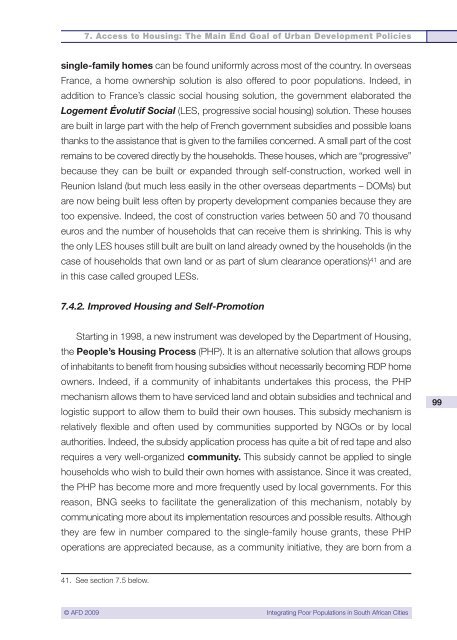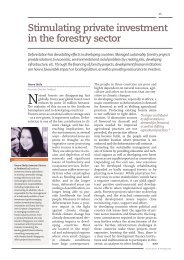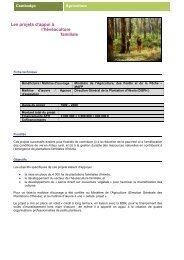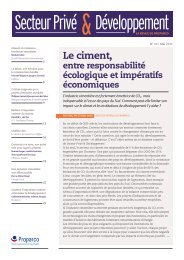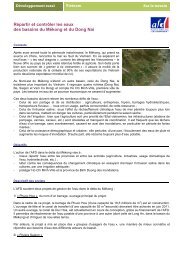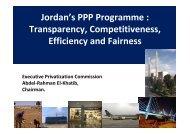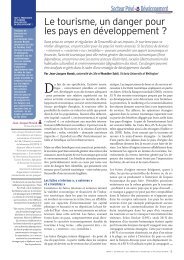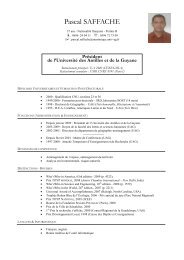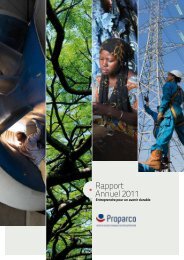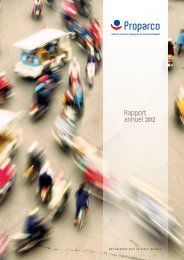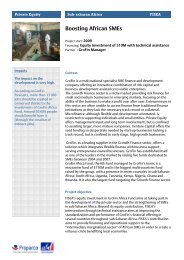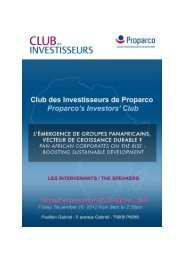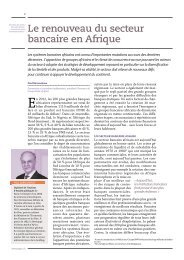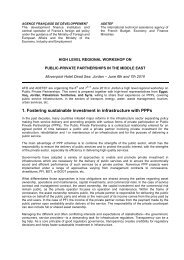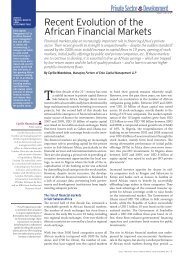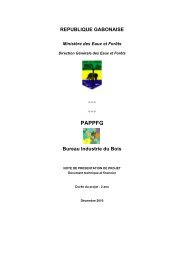Integrating Poor Populations in South African Cities - Agence ...
Integrating Poor Populations in South African Cities - Agence ...
Integrating Poor Populations in South African Cities - Agence ...
Create successful ePaper yourself
Turn your PDF publications into a flip-book with our unique Google optimized e-Paper software.
7. Access to Hous<strong>in</strong>g: The Ma<strong>in</strong> End Goal of Urban Development Policies<br />
s<strong>in</strong>gle-family homes can be found uniformly across most of the country. In overseas<br />
France, a home ownership solution is also offered to poor populations. Indeed, <strong>in</strong><br />
addition to France’s classic social hous<strong>in</strong>g solution, the government elaborated the<br />
Logement Évolutif Social (LES, progressive social hous<strong>in</strong>g) solution. These houses<br />
are built <strong>in</strong> large part with the help of French government subsidies and possible loans<br />
thanks to the assistance that is given to the families concerned. A small part of the cost<br />
rema<strong>in</strong>s to be covered directly by the households. These houses, which are “progressive”<br />
because they can be built or expanded through self-construction, worked well <strong>in</strong><br />
Reunion Island (but much less easily <strong>in</strong> the other overseas departments – DOMs) but<br />
are now be<strong>in</strong>g built less often by property development companies because they are<br />
too expensive. Indeed, the cost of construction varies between 50 and 70 thousand<br />
euros and the number of households that can receive them is shr<strong>in</strong>k<strong>in</strong>g. This is why<br />
the only LES houses still built are built on land already owned by the households (<strong>in</strong> the<br />
case of households that own land or as part of slum clearance operations) 41 and are<br />
<strong>in</strong> this case called grouped LESs.<br />
7.4.2. Improved Hous<strong>in</strong>g and Self-Promotion<br />
Start<strong>in</strong>g <strong>in</strong> 1998, a new <strong>in</strong>strument was developed by the Department of Hous<strong>in</strong>g,<br />
the People’s Hous<strong>in</strong>g Process (PHP). It is an alternative solution that allows groups<br />
of <strong>in</strong>habitants to benefit from hous<strong>in</strong>g subsidies without necessarily becom<strong>in</strong>g RDP home<br />
owners. Indeed, if a community of <strong>in</strong>habitants undertakes this process, the PHP<br />
mechanism allows them to have serviced land and obta<strong>in</strong> subsidies and technical and<br />
logistic support to allow them to build their own houses. This subsidy mechanism is<br />
relatively flexible and often used by communities supported by NGOs or by local<br />
authorities. Indeed, the subsidy application process has quite a bit of red tape and also<br />
requires a very well-organized community. This subsidy cannot be applied to s<strong>in</strong>gle<br />
households who wish to build their own homes with assistance. S<strong>in</strong>ce it was created,<br />
the PHP has become more and more frequently used by local governments. For this<br />
reason, BNG seeks to facilitate the generalization of this mechanism, notably by<br />
communicat<strong>in</strong>g more about its implementation resources and possible results. Although<br />
they are few <strong>in</strong> number compared to the s<strong>in</strong>gle-family house grants, these PHP<br />
operations are appreciated because, as a community <strong>in</strong>itiative, they are born from a<br />
99<br />
41. See section 7.5 below.<br />
© AFD 2009 <strong>Integrat<strong>in</strong>g</strong> <strong>Poor</strong> <strong>Populations</strong> <strong>in</strong> <strong>South</strong> <strong>African</strong> <strong>Cities</strong>


